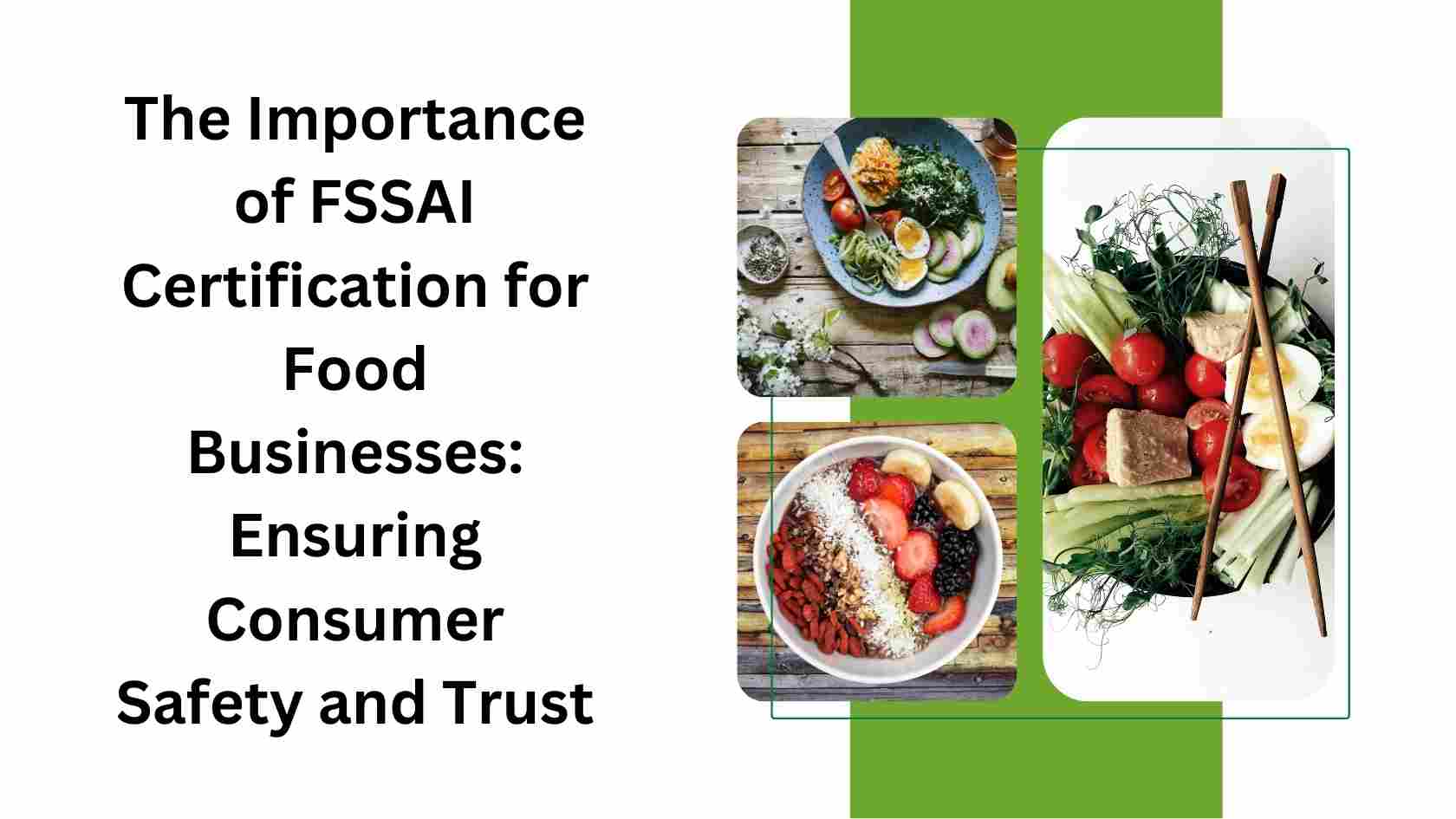The Importance of FSSAI Certification for Food Businesses: Ensuring Consumer Safety and Trust

The FSSAI certificate refers to the certification granted by the Food Safety and Standards Authority of India (FSSAI), an autonomous body established under the Ministry of Health & Family Welfare, Government of India. The primary purpose of FSSAI is to ensure food safety and regulate the food industry to protect the health of consumers.
The FSSAI Certificate is a legal requirement for individuals or businesses involved in the manufacturing, processing, packaging, storage, distribution, and sale of food products in India. It is essentially a license that signifies compliance with the food safety and hygiene standards set by the FSSAI.
Ensuring Consumer Safety:
The primary purpose of FSSAI certification is to safeguard the health and well-being of consumers. By adhering to the stringent standards set by the FSSAI, food businesses commit to maintaining hygiene, quality, and safety in their food production processes. Consumers, when aware of the FSSAI certification, can trust that the food they are consuming has undergone thorough scrutiny, reducing the risk of contamination, adulteration, or any other health hazards.
Building Consumer Trust:
Consumer trust is a valuable asset for any business, especially in the food industry where the stakes are high. FSSAI certification acts as a visible symbol of a company’s commitment to delivering safe and high-quality food products. When consumers see the FSSAI logo on a product, it instills confidence, as it signifies that the business has met the stringent regulatory requirements. This trust, once established, can lead to repeat business, positive word-of-mouth, and increased brand loyalty.
Legal Compliance and Market Access:
FSSAI certification is not just about ensuring consumer safety; it is also a legal requirement for food businesses in India. Operating without FSSAI certification can result in serious legal consequences, including fines and closure of the business. Additionally, many retailers and distributors require FSSAI certification before agreeing to stock and sell products. Therefore, obtaining the certification opens doors to wider market access, allowing businesses to reach more consumers and explore new opportunities.
Consumer Education and Empowerment:
FSSAI certification not only serves as a marker of compliance but also acts as a tool for consumer education. The certification process involves adherence to specific labeling requirements, including nutritional information and allergen declarations. This empowers consumers to make informed choices about the products they purchase, catering to diverse dietary needs and preferences. Through FSSAI certification, businesses contribute to a culture of transparency, enabling consumers to make healthier and safer decisions for themselves and their families.
Competitive Edge in the Market:
In a crowded marketplace, FSSAI certification provides a distinct competitive advantage. Consumers are increasingly discerning and are more likely to choose products that carry the FSSAI seal of approval. This certification signals a commitment to quality, setting certified businesses apart from their competitors. As consumer awareness grows regarding food safety, having FSSAI certification can be a decisive factor in attracting and retaining customers, thereby strengthening the market position of a food business.
Global Recognition and Export Opportunities:
For businesses eyeing international markets, FSSAI certification is often a prerequisite. Many countries require imported food products to meet specific safety and quality standards, and FSSAI certification is a testament to compliance with these international benchmarks. Obtaining FSSAI certification can facilitate smoother entry into global markets, opening doors to export opportunities and allowing businesses to showcase their commitment to quality on an international stage.
Note: You can also Renewal of FSSAI License
Continuous Improvement and Adaptation:
FSSAI standards are not static; they evolve to address emerging challenges and technological advancements in the food industry. By engaging with the certification process, businesses commit to continuous improvement and adaptation to these changing standards. This proactive approach not only enhances the safety of food products but also positions businesses as industry leaders committed to staying ahead of the curve.
Conclusion:
In conclusion, FSSAI certification is not merely a bureaucratic formality; it is a cornerstone of consumer safety and trust in the food industry. Businesses that prioritize obtaining and maintaining FSSAI certification demonstrate their commitment to providing safe and quality food products. Beyond legal compliance, FSSAI certification serves as a powerful marketing tool, building a bridge of trust between businesses and consumers. In an era where transparency and accountability are paramount, FSSAI certification is an investment that pays dividends in both consumer satisfaction and business success. Food businesses, big or small, cannot afford to overlook the importance of FSSAI certification in ensuring the well-being of their customers and establishing a solid foundation for long-term success.




